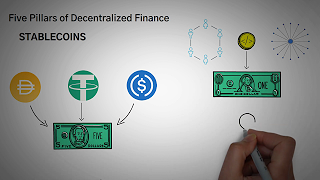
Blockchain technology has a knack for reshaping industries, and it may soon revolutionize the world of scientific research. Decentralized Science (DeSci) is emerging as a transformative application of blockchain, akin to how Decentralized Finance (DeFi) disrupted traditional finance in 2017. By integrating decentralization into science, DeSci aims to make research more transparent, community-driven, and equitable.

With early-stage projects gaining traction and institutional investors taking notice, DeSci could be poised for exponential growth. Its parallels to DeFi’s early days make it one of blockchain’s most exciting developments in 2024.
What is Decentralized Science (DeSci)?
Decentralized Science (DeSci) leverages blockchain technology to transform the scientific research ecosystem. Unlike traditional science, which often operates through opaque processes controlled by a few centralized entities, DeSci emphasizes open collaboration, transparency, and equitable rewards.
By utilizing blockchain’s unique tools—such as tokens, NFTs, and decentralized autonomous organizations (DAOs)—DeSci empowers researchers to share data, secure funding, and monetize intellectual property in innovative ways. The goal? To foster a global, community-driven research network free from bureaucratic bottlenecks.
Why DeSci Could Be the Next Big Thing in Blockchain
The enthusiasm around DeSci mirrors the excitement that surrounded DeFi in its infancy. DeFi disrupted finance by removing intermediaries and enabling peer-to-peer transactions, democratizing access to financial tools. Similarly, DeSci could disrupt traditional research models by:
- Democratizing access to research: Allowing researchers worldwide to contribute and access scientific data without gatekeepers.
- Creating transparent funding mechanisms: Using blockchain to track funding sources and ensure equitable distribution of resources.
- Tokenizing intellectual property: Enabling researchers to monetize their work directly through blockchain-powered tokens and NFTs.
- Enhancing collaboration: Leveraging DAOs to manage collaborative research projects democratically.
These innovations could dramatically reduce inefficiencies in how research is conducted, funded, and shared, potentially unlocking new breakthroughs in science.

DeSci Tokens: The Emerging Market to Watch
Much like DeFi tokens led the 2017 bull market, DeSci tokens are gaining attention for their potential high-growth opportunities. Despite their nascent stage, the market cap for top DeSci tokens remains under $1 billion—a figure reminiscent of DeFi’s early days.
Top DeSci Tokens to Watch
- OriginTrail (TRAC):
- Focus: Decentralizing AI-driven scientific data.
- Growth: TRAC’s token price has surged 127% since mid-October and saw a 645% rally between late 2023 and early 2024.
- Backing: Institutional support from Binance Labs and the Solana Foundation underscores its credibility.
- Rifampicin (RIF):
- Focus: Streamlining pharmaceutical research with decentralized platforms.
- Appeal: Low market cap makes it attractive to investors seeking high-risk, high-reward opportunities.
- Hypocrite (HPO):
- Focus: Addressing inefficiencies in academic publishing and peer review systems.
- Innovation: Allows researchers to submit and review articles through a blockchain-based incentive system.
- ResearchCoin (RSC):
- Focus: Crowdfunding and data sharing for independent researchers.
- Opportunity: Designed for the growing market of decentralized knowledge exchange.
These tokens showcase the breadth of innovation within the DeSci sector and highlight the market’s untapped potential.
Institutional Interest Validates DeSci’s Potential
Institutional backing is a strong signal of DeSci’s promise. Industry heavyweights such as Binance Labs, the Solana Foundation, and grassroots DAOs have invested heavily in DeSci projects, offering both credibility and momentum.
This mirrors the trajectory of DeFi’s growth, which was catalyzed by institutional involvement in its early stages. For DeSci, these endorsements could attract more funding and accelerate mainstream adoption.

Challenges Facing Decentralized Science
While the potential of DeSci is undeniable, several hurdles must be addressed for it to thrive:
- Regulatory Uncertainty:
Blockchain projects often face scrutiny from regulators, and DeSci is no exception. Defining clear legal frameworks will be essential for its long-term success. - Adoption Barriers:
Convincing traditional scientific institutions to embrace blockchain will require education and evidence of its practical benefits. - Scalability:
As DeSci projects grow, ensuring blockchain networks can handle increased demand without compromising speed or security will be critical. - Funding Risks:
While DeSci tokens offer exciting investment opportunities, their volatility may deter cautious investors.
Addressing these challenges will require collaboration between innovators, investors, and policymakers.
The Road Ahead for DeSci
The parallels between DeSci and DeFi suggest a bright future for decentralized science. If early-stage projects can deliver on their promises, DeSci could democratize access to scientific knowledge and reshape how research is conducted and shared.
For investors, this presents a unique opportunity to get in on the ground floor of a revolutionary movement. Just as early DeFi adopters reaped substantial rewards, those who embrace DeSci now could see significant returns as the market matures.
FAQs
What is Decentralized Science (DeSci)?
Decentralized Science (DeSci) applies blockchain technology to scientific research, aiming to make it more transparent, equitable, and collaborative through tools like tokens, DAOs, and NFTs.
How does DeSci compare to DeFi?
While DeFi disrupted traditional finance by eliminating intermediaries, DeSci seeks to revolutionize scientific research by democratizing access, funding, and collaboration.
What are some promising DeSci tokens?
Top tokens include OriginTrail (TRAC), Rifampicin (RIF), Hypocrite (HPO), and ResearchCoin (RSC), all of which are gaining traction for their innovative applications in decentralized research.
Why are institutional investors backing DeSci?
Institutions like Binance Labs and the Solana Foundation see DeSci as a high-potential sector, similar to early DeFi, and have invested significantly in its development.
What challenges does DeSci face?
Key challenges include regulatory uncertainty, adoption barriers, scalability issues, and the volatility of DeSci tokens.
How can investors benefit from DeSci?
By investing early in promising DeSci tokens, investors can potentially secure high returns as the market develops and gains mainstream adoption.
Conclusion

Decentralized Science (DeSci) could mark blockchain’s next big revolution, with the potential to democratize research, enhance collaboration, and drive innovation. Early signs of growth, combined with institutional interest, suggest a promising future for this emerging sector. For Bitcoin enthusiasts and blockchain advocates, DeSci offers a rare chance to witness and participate in the evolution of science itself.

